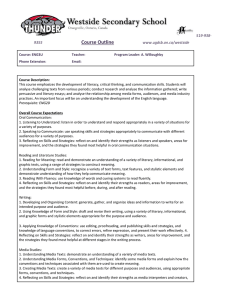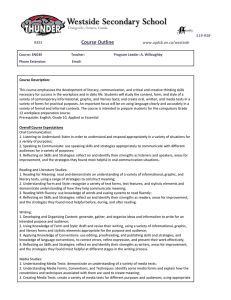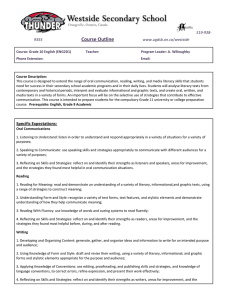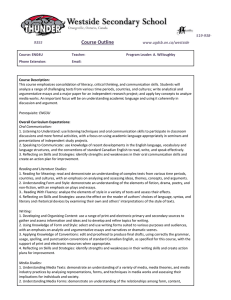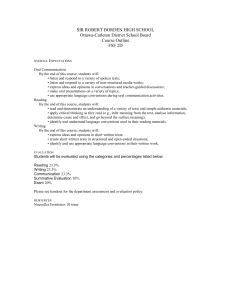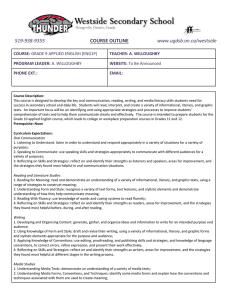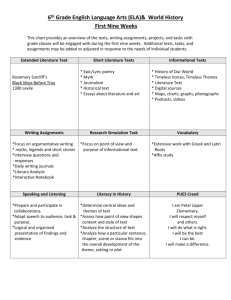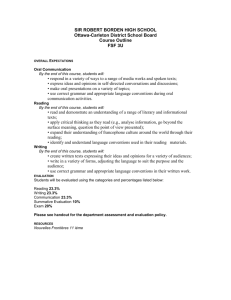Course Outline 519-938- 9355
advertisement
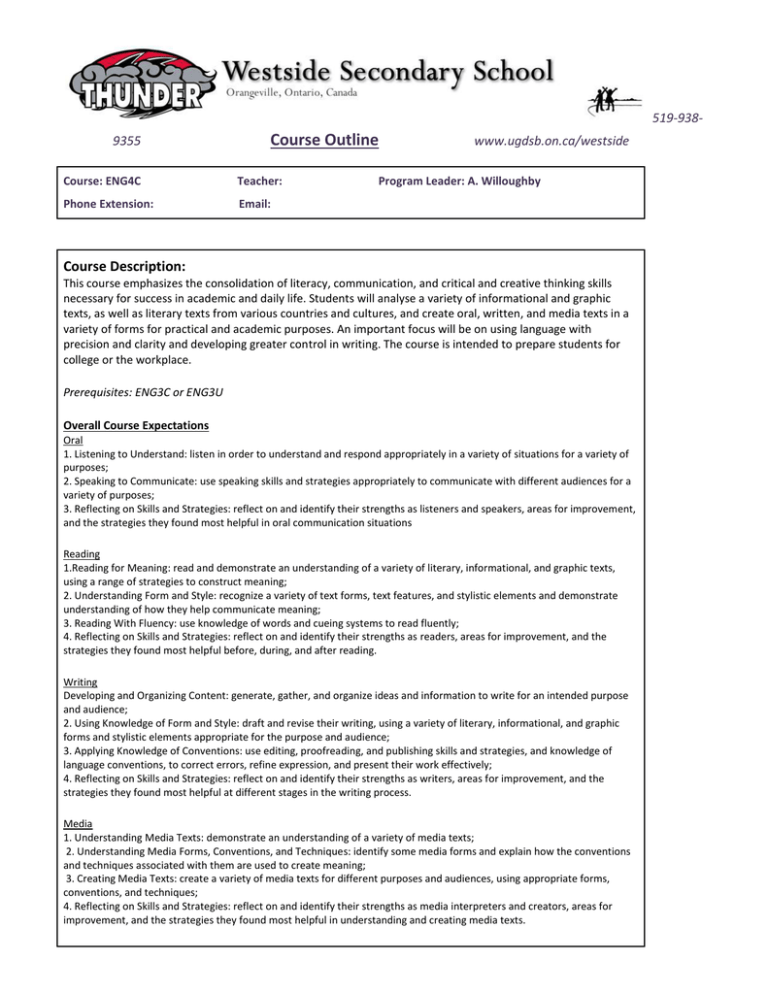
519-9389355 Course Outline Course: ENG4C Teacher: Phone Extension: Email: www.ugdsb.on.ca/westside Program Leader: A. Willoughby Course Description: This course emphasizes the consolidation of literacy, communication, and critical and creative thinking skills necessary for success in academic and daily life. Students will analyse a variety of informational and graphic texts, as well as literary texts from various countries and cultures, and create oral, written, and media texts in a variety of forms for practical and academic purposes. An important focus will be on using language with precision and clarity and developing greater control in writing. The course is intended to prepare students for college or the workplace. Prerequisites: ENG3C or ENG3U Overall Course Expectations Oral 1. Listening to Understand: listen in order to understand and respond appropriately in a variety of situations for a variety of purposes; 2. Speaking to Communicate: use speaking skills and strategies appropriately to communicate with different audiences for a variety of purposes; 3. Reflecting on Skills and Strategies: reflect on and identify their strengths as listeners and speakers, areas for improvement, and the strategies they found most helpful in oral communication situations Reading 1.Reading for Meaning: read and demonstrate an understanding of a variety of literary, informational, and graphic texts, using a range of strategies to construct meaning; 2. Understanding Form and Style: recognize a variety of text forms, text features, and stylistic elements and demonstrate understanding of how they help communicate meaning; 3. Reading With Fluency: use knowledge of words and cueing systems to read fluently; 4. Reflecting on Skills and Strategies: reflect on and identify their strengths as readers, areas for improvement, and the strategies they found most helpful before, during, and after reading. Writing Developing and Organizing Content: generate, gather, and organize ideas and information to write for an intended purpose and audience; 2. Using Knowledge of Form and Style: draft and revise their writing, using a variety of literary, informational, and graphic forms and stylistic elements appropriate for the purpose and audience; 3. Applying Knowledge of Conventions: use editing, proofreading, and publishing skills and strategies, and knowledge of language conventions, to correct errors, refine expression, and present their work effectively; 4. Reflecting on Skills and Strategies: reflect on and identify their strengths as writers, areas for improvement, and the strategies they found most helpful at different stages in the writing process. Media 1. Understanding Media Texts: demonstrate an understanding of a variety of media texts; 2. Understanding Media Forms, Conventions, and Techniques: identify some media forms and explain how the conventions and techniques associated with them are used to create meaning; 3. Creating Media Texts: create a variety of media texts for different purposes and audiences, using appropriate forms, conventions, and techniques; 4. Reflecting on Skills and Strategies: reflect on and identify their strengths as media interpreters and creators, areas for improvement, and the strategies they found most helpful in understanding and creating media texts. Instructional Strategies: Westside teaching staff will use a variety of instructional strategies to help students develop and improve skills in the following areas: character, citizenship, communication, critical thinking and problem solving, collaboration and teamwork, and creativity and imagination. Assessment and Evaluation: Each unit will have one or more major culminating assignments. As well, the students will be required to submit a final culminating activity at the end of the semester. ● When a student has not submitted a summative evaluation, then a mark of zero may be assigned, and the teacher will use professional judgment to determine the impact on the overall report card. ● Consequences of cheating and plagiarism may include academic penalties (e.g. loss of marks up to loss of full marks redo all or part of the work) and/or disciplinary action. See school website for complete policy. ● Oral presentations must be completed within the assigned presentation schedule, otherwise students will be given one more opportunity to present for a completion mark only. ● Conferencing, as an assessment strategy, is of paramount important to student success in this course. Late Work Students are expected to complete all assigned work and submit it by the teacher's established due date. Every attempt will be made to encourage students to complete all assigned work on time so their grade represent their actual achievement. Should a student submit work past the due date, a late mark penalty will be assigned. All summative assessments must be submitted for course credit. Please see Westside's Assessment and Evaluation Policy for more details. The strands of Literature Studies and Reading, Writing, Language and Media Studies, will each be evaluated within the following achievement categories as outlined by the Ministry Guidelines: 25% Knowledge and Understanding 25% Thinking and Inquiry 25% Communication 25% Application ● Term work will be worth 70% of the final mark. (The Independent Study Unit is worth 20% of term mark.) ● The culminating activity will be worth 30% of the final mark. Term Work (70%) Unit of Study Summative Evaluations Can you be a bystander in life? Elie Wiesel’s Night Various articles 1. Photo Essay and presentation 2.Unit Test Big Ideas: ● Conflict is essential for human development. ● A person must be the change s/he wishes to see in the world. ● People’s lives and literature follow similar patterns. Bias and perspective influence a person’s understanding. Understanding our Reflections in Society: Stereotypes/Bias Numerous articles, media and texts 1. Unit Test 2. Report and presentation Big Ideas: ● Authors manipulate an audience for an intended purpose. ● Literature and media can reflect or distort society’s realities. ● Themes are universal. Our environments shape who we are; we can also shape our environment. Drama and Social Norms: One Flew1. Over the Cuckoo’s Nest Annotated Bibliography Big Ideas: ● Our environments shape who we are; we can also shape our environment. ● Drama mirrors social norms and constructions or highlights concerns within a society. Conflict shows a person’s true nature. Culminating Activities ISU: Students will have allocated time thorough out the semester to research a topic of their choosing somehow linked into a Big Idea of the course (10%) Final Exam (20%) Other Information: i) A record will be kept on the student’s following Learning Skills (as outlined by the Ministry Guidelines): Responsibility, Organization, Independent Work, Collaboration, Initiative, Self-regulation. ii) It is the student’s responsibility to speak directly with the teacher before handing in a late assignment. iii) Students are expected to keep track of all assignments and ensure that they are submitted to the teacher. Should the student fail to submit any projects or assignments, this will be reflected in his or her mark. iv) All essays and assignments must be submitted as a hardcopy to the teacher. Summative assessments must be uploaded to www.turnitin.com. Marked assignments with comments will not be returned until the assignment has been submitted. v) Students are expected to return their books in the condition they received them. Otherwise the following replacement costs will apply: Night: $20 One Flew Over the Cuckoo’s Nest: $20 I have read and understand the Course Outline: Student Name (please print): ________________________________ Signature: ________________________________ Parent/Guardian Name (please print): _________________________Signature: ________________________________
